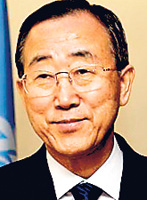United Nations Secretary General Ban Ki-moon on Friday called to probe “any credible accusations of human rights violations” -- war crimes -- committed during the final phase of the war against separatist Tiger guerrillas, but Sri Lanka yesterday rejected the call.
“The Government of Sri Lanka firmly stands by its earlier position that no such probe will be initiated, both local and otherwise,” Foreign Secretary Palitha Kohona said. The use of the words “any credible accusation” suggests that even the head of the UN is negative, he told the Sunday Times.
Mr. Ban’s remarks in New York came after he briefed members of the UN Security Council on his May visit to Sri Lanka. His near 36 hour itinerary included a tour of the one-time No-Fire Zone in the Mullaitivu district.
 |
| Ban Ki-moon |
Dr. Kohona’s remarks appeared at variance with those made to the Reuters news agency by H.M.G.S. Palihakkara, Sri Lanka’s Permanent Representative at the UN. He was quoted as saying in a news report dealing with the UN Secretary General’s remarks that the Government had “initiated a process of reconciliation and fact finding.”
Asked for his comments, Dr. Kohona said “we stand by that quote.” Foreign Ministry officials explained that the assertion only meant there would be fact finding if and when the situation arose.
Mr. Ban told a news conference after he briefed the Security Council: “I would like to ask the Sri Lankan Government to recognize the international call for accountability and full transparency. And whenever and wherever there are credible allegations of violations of humanitarian law, there should be a proper investigation.”
He added: “Any inquiry, to be meaningful, should be supported by the members of the United Nations, and also should be very impartial and objective. I have been urging the Sri Lankan President on this matter. He assured me that he will institute the necessary procedures to ensure the transparency and accountability of this [process].”
Mr. Ban said he had three objectives during his Sri Lanka visit. First was to urge the Sri Lankan Government to allow “unimpeded access” by international humanitarian workers, including UN agencies to help more than 300,000 displaced people. Second was to help the displaced people and the Government to re-settle them in their original home provinces. Third was to help Sri Lankan Government to reach out to the minorities, including Tamils and Muslims.
The UN Chief cautioned that “It is very important at this time to unite and heal the wounds, rather than enjoy all this triumphalism in the wake of the end of conflict.”
Defence Secretary Gotabhaya Rajapaksa also strongly articulated the Government’s position.
In an interview with The Sunday Times (before the UN Secretary General briefed the Security Council), he said “I am not worried because we will not allow such a thing. It was proven at an international forum (the UNHCR), when the international community said in one voice that Sri Lanka had defeated the worst terrorist organization in the world and we must commend them on that and not punish them. The majority of the IC accepted the fact that the Sri Lankan government did the correct thing.”
UN concerns
- Probe on alleged human rights violations
- Access to refugee camps
- Reconciliation moves
- Detention of doctors who served in the war zone
|

